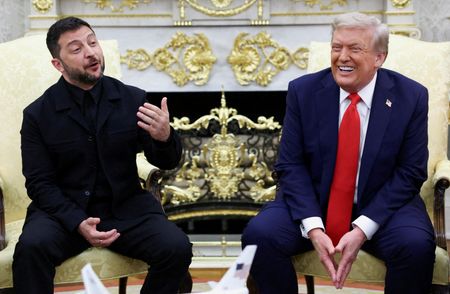LONDON (Reuters) -British factory exports shrank at their sharpest pace in almost five years and cost pressures intensified in April, according to a survey that showed the impact of U.S. President Donald Trump’s trade war and a UK tax hike for employers.
Foreign demand for British manufactured goods fell in the United States, Europe and China, S&P Global said on Thursday. The pace of decline for exports was the fastest since May 2020 during the COVID-19 pandemic.
The headline S&P Global Purchasing Managers’ Index for UK manufacturing came in at 45.4 in April, remaining below the 50.0 threshold that divides growth from contraction for the seventh month in a row.
However, the reading was above March’s 44.9 and April’s preliminary reading of 44.0.
Manufacturing output fell for the sixth consecutive month.
Last week, the International Monetary Fund downgraded its UK economic growth forecast in 2025 to 1.1% but said the country was likely to grow more strongly than France, Italy or Germany.
The Bank of England, which is expected to cut interest rates by a quarter-point to 4.25% next week, has said it is too early to say how the tariffs will affect inflation, although BoE Governor Andrew Bailey has said it will likely hit growth.
“The start of the second quarter saw UK manufacturing buffeted by adverse global market conditions, rising cost pressures, deteriorating supply chains and increased trade uncertainty,” Rob Dobson, director at S&P Global Market Intelligence, said.
“Surveyed manufacturers noted that US tariff announcements were having a noticeable impact on global markets as trading partners adapt to increased trade volatility.”
Business morale among manufacturers sank to its lowest since November 2022, S&P Global said.
Input costs rose at the fastest pace since December 2022 with higher wage costs in Britain and global supply chain uncertainties linked to Trump’s tariff plans contributing to the rise. Prices charged by firms increased at the fastest pace in more than two years.
The survey’s measure of staffing contracted for the sixth month running in April. Firms linked the shrinkage to the government’s increase in social security contributions by employers and a nearly 7% rise in the minimum wage that came into force last month.
(Reporting by Suban Abdulla; Editing by William Schomberg and Hugh Lawson)










